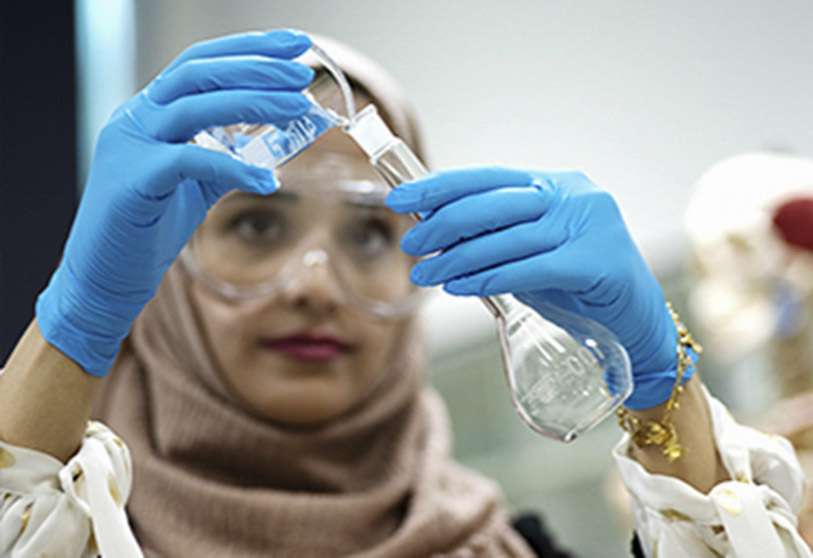COVID-19 and higher education in the Gulf: Are e-learning solutions here to stay?

After facing the challenge of the pandemic early last year, educational institutions in the Gulf have continued to develop their digital strategies as part of broader plans for the future.
Following the outbreak of the new coronavirus, many universities, schools and technical colleges, which were in the middle of the academic year, quickly adapted to the new situation by adopting digital learning platforms and making learning materials available online.
One of those leading the transition was the Higher Colleges of Technology (HCT) in the United Arab Emirates, the country's largest applied higher education institution.
During 4-5 March, a few days after all in-person classes and events were cancelled on 1 March, HCT launched a two-day e-learning pilot programme, in which 20,000 students participated in 272 online training sessions and 3,000 online lectures.

To ensure that assignments could be completed properly, HCT worked with companies such as Blackboard and Zoom to set up online platforms for students and academics alike.
Elsewhere, Bahrain was a regional leader in terms of adapting to online learning. The Bahrain Ministry of Education and the Bahrain Information and E-Government Authority, together with international cloud computing platform Amazon Web Services, quickly established a dedicated e-learning portal to enable students to continue their studies remotely.
This was complemented by an additional online service that allowed teachers to connect with students online. Using Microsoft Teams and Office 365 software, the initiative enabled teachers to deliver lessons while dedicated support staff were available to answer students' specific questions.
As a sign of the success of these initiatives, within a month around 150,000 students had been able to continue their studies through remote methods.

Beyond initial attempts to keep classes running during the early stages of the pandemic, many institutions have made these digital solutions permanent features of their educational offerings.
"The pandemic has underscored the important role that technology can play in higher education," Michael Trick, dean of Carnegie Mellon University in Qatar, told OBG in November.
As at the beginning of the pandemic, HCT has been a leader in terms of adopting digital innovations.
Moving away from a strictly physical model, the institution has sought to establish what it calls an "Uber-like" on-demand virtual classroom model, shifting key educational pillars, including online classes, lectures, quizzes and exams.
However, in addition to offering learning materials, HCT has aimed to create a virtual campus experience through its DIGI Campus platform, offering online counselling and life skills support; e-health, nutrition and fitness programmes; e-reading spaces that attempt to recreate the library environment with book review sessions via Blackboard; and e-competitions and e-student clubs.

While digital solutions will have a permanent impact on the delivery of education, it is clear that not all aspects of all courses are suited to a remote model. While a number of constraints remain, many universities have built on their recent e-learning experience and adopted a hybrid or blended learning approach, combining online study with limited face-to-face interaction.
To this end, HCT has introduced a model whereby courses requiring hands-on learning, such as laboratory work, applied research and some entrepreneurship activities, can be completed on campus, while other theoretical courses are completed remotely.
This has also allowed the university to focus on in-demand sectors and subsequently expand in-person offerings to health sciences, food safety, computer science and applied research.
Hybrid approaches have also been used elsewhere for a variety of practical and health purposes.
For example, in July last year, Egypt's Supreme Council of Universities announced that a hybrid education model would be implemented, with a view to minimising student density on campuses. Meanwhile, in October, education authorities in Abu Dhabi launched a pilot project for its Virtual Charter School, a hybrid learning option for expatriate students whose families were affected by the economic consequences of COVID-19.

While several educational institutions in the region have successfully transitioned to a distance learning model, this has only been possible where a solid ICT infrastructure was already in place.
"Virtual learning has proven to be a powerful tool. However, providing such learning requires substantial and sustained investment over time," Tara Waudby, head of school at Riffa Views International School, told OBG in April last year.
"In Bahrain, the rapid deployment of appropriate e-learning tools in many public schools is actually the result of a great deal of effort over time by schools investing in ICT infrastructure, innovative learning pedagogies and crisis management planning."
Indeed, HCT's landmark transition to digital learning was only possible because of significant investment in ICT infrastructure. Since 2018, the college had planned to develop more digital or hybrid solutions to help meet the needs of the so-called Fourth Industrial Revolution, but then accelerated this in response to the pandemic.








